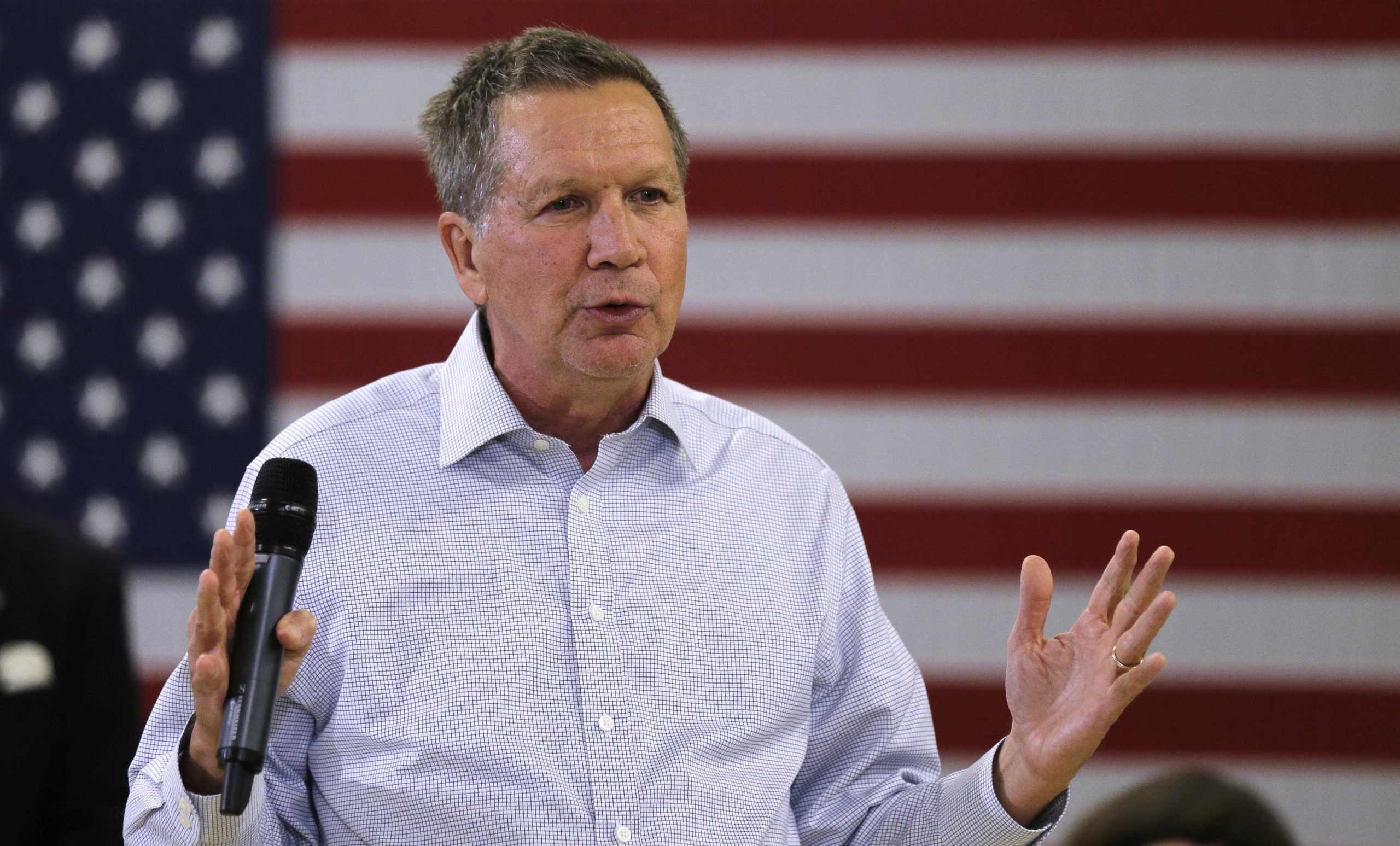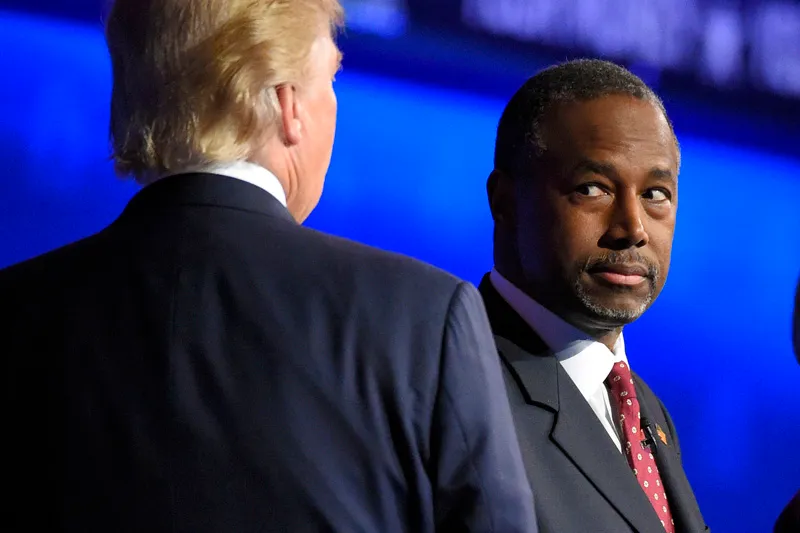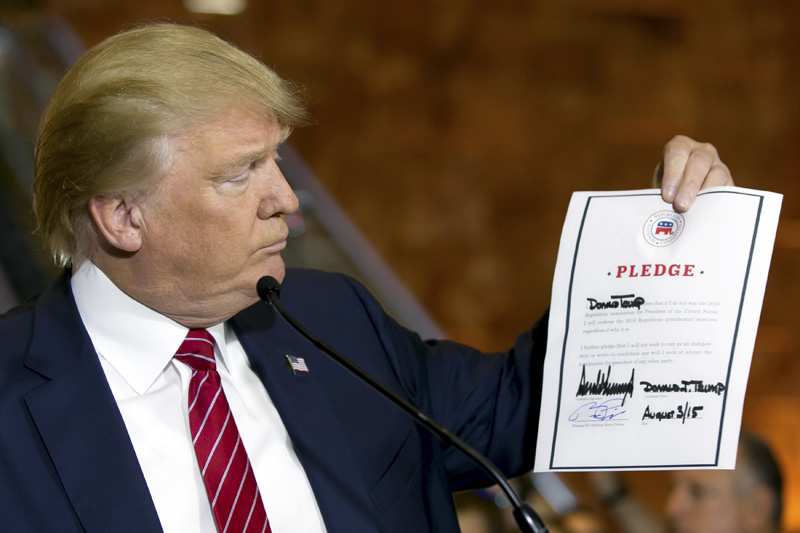There’s a nightmare that wakes Republican insiders in a cold sweat. It’s the image of Donald Trump striding to the podium at the 2016 national convention in Cleveland. He is wearing his trademark red “Make America Great Again” baseball cap. He is beaming. And he is accepting the Republican presidential nomination.
Sound farfetched? Trump has now led in New Hampshire nearly twice as long as Scott Walker was a presidential candidate. A recent Fox News poll found him leading in South Carolina with 30 percent of the vote, double the share going to the runner-up. It also showed him climbing higher rather than sinking after his controversial proposal to bar Muslims from entering the United States.
That’s part of a larger pattern with the real estate developer and reality TV star: Every controversy that was supposed to do Trump in has either blown over or made him stronger. It’s become a standard part of Trump’s campaign stump speech. The billionaire notes that people first doubted he would run, then expressed skepticism that he would file the required financial disclosure forms and then that he would put together any kind of ground game in the early primary states. The doubters were wrong on every count.
“Everybody seems to be banking on him fizzling out on his own,” said a senior Republican operative based in Washington. “But it’s December now; hope is no longer a legitimate strategy.”
Deep opposition to Trump is welling up not only within the governing wing of the Republican Party, but also in the conservative movement, which has watched in horror as he has led GOP primary polls while taking positions on healthcare, eminent domain and taxes that are anathema to their limited-government principles and to broader conservative ideas. What is lacking is any kind of unified strategy to stop him.
But not everyone is relying on hope to beat Trump.
New Day for America, the super political action committee supporting Republican contender John Kasich, governor of Ohio, has transformed itself into a group dedicated to stopping Trump. It has budgeted $2.5 million over the next 60 days for an anti-Trump campaign. Trump Card LLC, a third party organization formed to defeat Trump’s primary bid, launched in November, directed by veteran GOP operative Liz Mair.

New Day for America, the super PAC supporting Ohio Gov. John Kasich’s campaign, has transformed itself into a group dedicated to stopping Trump. AP PHOTO
Both Matt David, who runs Kasich’s super PAC, and Mair believe Trump is vulnerable, if only a candidate or outside group would prosecute a consistent, well-funded and focused broadside exposing his many liberal positions on major issues and controversial rhetoric about ethnic and religious minorities. Their plans involve using traditional paid and earned media, along with grassroots activities. They say the response to their respective efforts has been encouraging.
“The market is not huge and deep,” Mair told the Washington Examiner. “But the market exists.”
“There’s absolutely a hunger amongst donors, but an equal amount of tepidity,” David added.
The hesitation David spoke of is borne of indecision over what to do and what happens if Trump’s candidacy is derailed.
There’s a divide over whether a third-party group that exists only to snuff out Trump’s presidential bid will boomerang. In a campaign that has revealed voter anger with the Republican establishment and suspicion of political elites, party insiders fear that even voters skeptical of Trump might side with the New York billionaire if the organization trying to tear him down is identified with big GOP donors and Beltway political strategists.
Hitting Trump’s ideological apostasy — he can be made to sound more like President Obama than a Tea Party conservative on foreign policy and government-run healthcare, for example — would be much more successful coming from one of his competitors, even one of his competitors’ designated super PACs. David and Mair agree with this line of thinking.
Concern that a third party effort to stop Trump might fail isn’t the only dynamic keeping GOP money on the sidelines. Many wealthy Republicans who would fund this sort of campaign fear that Sen. Ted Cruz would be the immediate beneficiary. Their opposition to Cruz as the nominee is old news. But what’s interesting is that many old guard Republican insiders might rather lose the general election with Trump than Cruz.
That’s because, despite Trump’s penchant for controversy and poor approval ratings among non-white voters, they believe Trump would do less damage to the GOP brand. Why? Because he is a celebrity with his own brand and not viewed by most voters as a “real” Republican. Cruz, on the other hand, might rebrand the GOP in his fiery, inflexible image, and Republican insiders worry that the party could get wiped out, all the way down the ballot.
Call to action
Many Republican donors are sitting on their hands waiting to see what happens once voting starts. Others fear that Trump would do long-term damage to the GOP with emerging voting blocs, hardening negative perceptions that prevented Mitt Romney winning more than 27 percent of Hispanic votes in 2012. That’s why there was such a fierce reaction to Trump’s proposal to exclude Muslims from the United States.
Former New Hampshire GOP chairman Fergus Cullen tried to get Trump removed from the Granite State primary ballot, arguing unsuccessfully that the billionaire isn’t really a Republican. He told the Boston Globe that Sen. Kelly Ayotte, the freshman New Hampshire Republican who is in for a tough re-election fight next year, “is losing votes every day because of Donald Trump.”
“This is no longer a joke,” Cullen said. “Donald Trump is a dangerous demagogue. He’s doing damage to the Republican brand that will prevent us from running a competitive national election next year.”

A former GOP official said Sen. Kelly Ayotte, R-N.H., who is up for re-election next year, is losing votes because of Trump. AP PHOTO
Should Trump win Iowa and New Hampshire and the 2016 primary boil down to the New Yorker versus someone not named Cruz, a flood of money from the Republican donor community is expected. Even if Cruz is the only alternative, expect considerable cash to be invested by veteran players who worry that Trump might ruin the GOP as a political vehicle for advancing conservatism. Few people believe Trump can win a head-to-head primary contest.
“If it’s just Trump versus an establishment candidate, this would allow the moneyed folks to coalesce around one guy, or woman,” said Jim Dornan, a Republican consultant in Washington. “The problem for the so-called establishment folks,” he added, is that if it’s not former Florida Gov. Jeb Bush, Sen. Marco Rubio of Florida, New Jersey Gov. Chris Christie or Kasich, “and that alternative is Cruz, my belief is that most of them just sit it out.”
GOP insiders are “extremely concerned — like defcon 1 concerned.” Yet, they also are convinced that Trump can, and probably will, get beat.
The key, party strategists say, is that a candidate with juice has to take him on, as opposed to a contender who is barely registering in the polls, as was the case with former candidates Rick Perry, the former governor of Texas, and Louisiana Gov. Bobby Jindal. Indeed, many Republicans, donors, strategists and senior officials expect this to happen in January, and it is believed Trump won’t prove invulnerable once his competitors draw sharper contrasts and voters are paying closer attention.
“The thing that ultimately beats Trump is the number 51,” Republican strategist Brad Todd said. “To be the nominee, a candidate needs to rip off a string of states where he gets 51 percent. Trump won’t get to 51, the only question is how much damage he does before he goes down.”

When Donald Trump fell behind Ben Carson in Iowa polls, the Club for Growth took credit for the businessman’s decline. AP PHOTO
One conservative group that has targeted Trump with some success is the Club for Growth. The group has a long track record of challenging Republicans who don’t hold the line on taxes and government growth, including some longtime incumbents. The Club advertised on TV against Trump in Iowa in mid-September, with a 30-second spot highlighting past liberal policy positions and quoting Trump, a former Hillary Clinton donor, as saying, “In many cases, I probably identify more as a Democrat.”
A second Club for Growth ad focused on Trump’s support for using eminent domain to benefit private developers including himself. It noted that Trump had backed the Supreme Court’s Kelo decision, which the ad described as giving “government massive new power to take private property and give it to corporations.” Trump was shown saying he agreed with it “100 percent.”
“Donald Trump has the worst record of the entire field with the possible exception of Bernie Sanders on economic growth policies,” Club for Growth president David McIntosh said at the press conference launching the ads. “Trump’s for higher taxes, he’s for single-payer, government-run healthcare, he’s for using the power of government to take people’s private property and turning it over to developers and he’s a protectionist that would lead America into a devastating trade war.”
When Trump fell behind Ben Carson in Iowa polls, the Club for Growth took credit for his decline. McIntosh crowed in an October statement, “The polls have made it clear: Trump loses when voters know the truth about him. He’s not a conservative, and he’s really just the worst kind of politician.”
Carson’s Iowa lead proved temporary, but perhaps the Club showed the way to beat Trump in a conservative state. The Carson and Cruz surges in Iowa suggest Trump has weaknesses among evangelicals that could be a problem for him as the campaign progresses.
Trump seems to sense his vulnerability. After signing a Republican National Committee pledge swearing off a third-party run and agreeing to support the eventual nominee, he began musing about bolting the party again. While he still maintains he would prefer to run as a Republican, Trump has refused to rule out a third party in recent interviews and has tweeted out poll results suggesting more than two-thirds of his current supporters would stick with him if he left the GOP.

After signing a Republican National Committee pledge swearing off a third-party run and agreeing to support the eventual nominee, he began musing about bolting the party again. AP PHOTO
“If they don’t treat me as the front-runner, by far the front-runner, if the playing field is not level, then certainly all options are open,” Trump said. “But that’s nothing I want to do.” Yet he has implied that spending money in an attempt to defeat him constitutes unfair treatment, citing Trump Card LLC’s activities as an example of a non-level playing field. He also points to Mair’s past work for the Republican National Committee in arguing that these activities are being formally sanctioned by the party.
Trump’s third-party talk seems to be a warning shot to the Republican establishment: Don’t mobilize against me or I’ll split the GOP vote in the general election.
In reality, the condensed primary calendar and limited number of debates agreed upon by the party establishment has probably benefited Trump. And as much as tactical disagreements have often crippled the Republican majority in the House, differences over tactics have prevented any such anti-Trump mobilization.
“Everybody is beatable, anybody is beatable,” said New Hampshire-based Republican strategist Dave Carney, adding that Trump is no exception to this rule. The question is how, and the time for answers is running out quickly.
